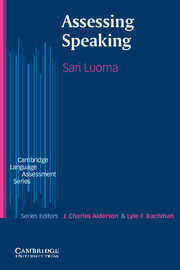Summary
When we develop speaking tests, we want the scores to be relevant to something outside the test. When the purpose of the test is rather general, as it is when we want to say something about the examinees' overall proficiency level, for example, we need a reference framework to help us explain what we mean by overall proficiency and how this is related to our test. One possibility is relating the test to a model of language ability. We can choose one model or several, depending on the types of explanations that we need in our testing context. In this chapter, I will discuss a range of models that can serve this purpose. I will also discuss the ways in which the models can be used in test development projects.
Models are not the only option for referencing speaking tests. Very often, learning-related assessments implement some of the goals of teaching curricula, for example. The curricula themselves may be based on a theoretical framework explicitly or implicitly, or they may be based on an eclectic combination of views about language learning. These, too, can help explain how the small sample of language that is rated during the assessment is related to the broader picture of language ability, but teaching frameworks are often not explicitly defined in coursebooks or curriculum documents. Models can be helpful for testing projects because they are usually presented in an explicit yet concise format, so that it is possible to view a test's construct definition in their light.
- Type
- Chapter
- Information
- Assessing Speaking , pp. 96 - 112Publisher: Cambridge University PressPrint publication year: 2004



